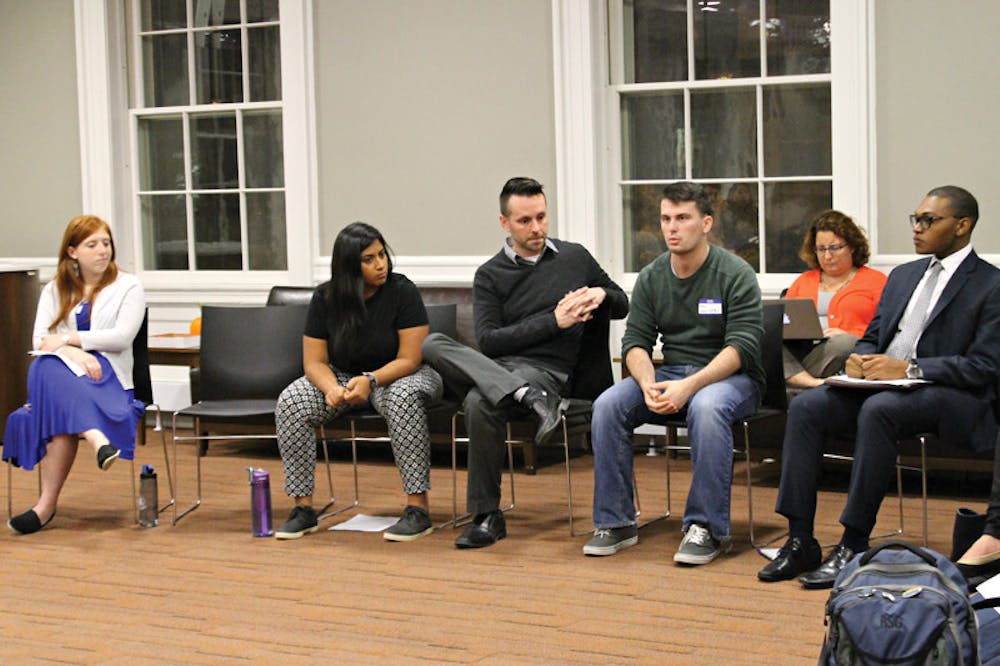The University will replace the online student group platform MyGroups with a more efficient software in January, said Timothy Shiner, director of student activities and the Stephen Robert ’62 Campus Center, at the Undergraduate Council of Students general body meeting Wednesday night.
Undergraduate Finance Board Chair Alex Sherry ’15 and Vice Chair Dakotah Rice ’16 also addressed the council about changes to student group categorization this semester.
“This will help move a lot of the process into the modern era,” Shiner said of the software switch. “This (new) program has the potential to be really cool, because this software is really powerful.”
In a second change aimed at helping student groups, event registration will now be done online rather than by submitting a paper form to the Student Activities Office, Shiner said.
Student groups often struggle with finding adequate spaces on campus to hold their events and activities, Shiner said. Dance groups in particular feel the pressure of finding larger, specialized spaces and often deal with scheduling issues such as extremely long waitlists for spaces, he added.
UFB has also streamlined its application process, Rice said. After meeting with a UFB representative, applicants can now fill out a budget template outline and then present at the UFB general body meeting.
“You’ll get a decision that night, and have those funds transferred to you that night” if the group is approved, Rice said. “We wanted to increase that transparency.”
Sherry cautioned the council against categorizing too many “capital-intensive” groups, as this could jeopardize the amount of funding each group receives. “It is something that you need to look at holistically,” he said. “Things don’t exist independently of each other — they are working together on Brown’s campus.”
“Every year a few groups go defunct, and then there are new groups,” Shiner said. “So in an ideal world, the number of groups would stay the same. Therefore, if groups don’t go defunct, recognizing new groups can be problematic.”
Shiner said he recognizes a trend at Brown of students feeling inclined to lead new groups rather than collaborating with groups already in place. “There’s definitely this desire to be the founder of something with a lot of students,” he said. “But I think there’s just as much value in taking on and improving something that already exists.”
In discussing building space and size constraints for student organizations, Shiner also said the University is entertaining potential plans to build a new performing arts center on campus in the next five to six years. Executive Vice President for Planning and Policy Russell Carey ’91 MA’06 and an external specialist in performing arts have been working for several months to outline a recommendation to the University, Shiner said.
“It’s not just a student group issue; it’s for the University,” he said. “That’s the long-term solution, and the short-term solution is to do the best we can” with existing spaces, he added.
The BrownConnect internship initiative team also appeared at the meeting to discuss its website with UCS members and ask for feedback. The group asked to remain off the record but revealed that the internship connection site is set to launch next month.
UCS Admissions and Student Services Chair Ryan Lessing ’17 and pending committee member Luke Camery ’17 proposed a resolution to create a new UCS committee called Brown Developer Exchange. The committee would aim to support students looking to create new technological platforms, such as websites or apps, for the Brown community.
“We’re going to get a group together — some UCS people, some (computer science) people and maybe others — working on some new projects,” Camery said. “There are some CS students who are just rabid to work on some of these websites.”
Lessing said he has discussed the subcommittee with Ravi Pendse P’17, chief information officer and vice president of Computing and Information Services. The subcommittee “ties in nicely” with Pendse’s goals, and the council “would be able to get the support that we need” from CIS, Lessing said, adding that one of the subcommittee’s potential projects could be reformulating the Banner website.
The council concluded its meeting by discussing the categorization of five student groups.
Hansori, a traditional Korean drumming group that has been dormant for several years on MyGroups, was approved to return as a Category 1 group, meaning it will not receive funding but can participate in the student group online platform, reserve campus spaces and make Morning Mail announcements. Stand Up!, a sexual assault discussion group that emerged last spring, and Brown University NAACP, which has not been active at Brown since the 1980s, were also approved as Category 1 groups.
Vagabond Magazine, a multicultural online magazine that was previously Category 1, was approved as a Category 2 group. In addition to the privileges of Category 1, it will now receive baseline funding of $200, which group members expressed the desire to use for a photography exhibit, team-building activities and a potential print edition.
Artbeat, a group aiming to make a safe, noncompetitive space for students to create and appreciate art, applied for Category 1 group status. But the council did not approve the group’s request due to a perceived lack of uniqueness in light of existing art groups.

ADVERTISEMENT




